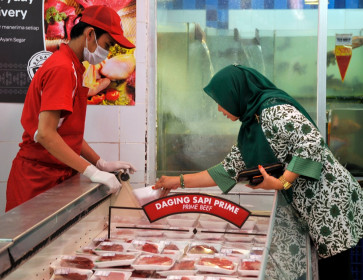Popular Reads
Top Results
Can't find what you're looking for?
View all search resultsPopular Reads
Top Results
Can't find what you're looking for?
View all search resultsHow Indonesia can take advantage of IA-CEPA
Australia’s cattle and red meat producers will obtain greater market access in Indonesia, as the Indonesian government is committed to issue, automatically and without seasonality, import permits used for import authorization for live cattle, frozen beef and sheep meat.
Change text size
Gift Premium Articles
to Anyone
T
he Indonesia-Australia Comprehensive Economic Partnership Agreement (IA-CEPA), which took effect on July 5, 2020 is expected to be a milestone in unlocking and realizing the vast potential of bilateral economic partnership and commercially meaningful outcomes between the two countries as currently their bilateral trade is considerably low, despite their close geographical proximity.
For instance, Indonesia’s Trade Ministry recorded total trade between Indonesia and Australia of around US$7.8 billion in 2019. This value is miniscule compared with China’s $73 billion total trade with Indonesia in the same year.
Under the IA-CEPA agreement both parties will enjoy certain preferential market access. For instance, Indonesian exports such as automotive products, timber, textiles, electronics and communication tools are expected to increase as Australia will eliminate the remaining import duties for such goods. In parallel, Australia’s cattle and red meat producers will obtain greater market access in Indonesia, as the Indonesian government is committed to issue, automatically and without seasonality, import permits used for import authorization for live cattle, frozen beef and sheep meat.
Article 3.4.1 of the agreement titled “Import Licensing” provides that import licensing measures imposed by both parties to the agreement are implemented in a transparent and predictable manner, and applied in accordance with the World Trade Organization’s (WTO) Agreement on Import Licensing Procedures (ILP).
It is important to note that a footnote is added to Article 3.4.1 which specifies specifically Indonesia’s commitment to guarantee the automatic issuance (and without seasonality) of import permits for live cattle and red meat products. Import licenses generally are issued either automatically or non-automatically.
As regards non-automatic licensing, the WTO’s ILP Agreement says they must not have trade-restrictive or -distortive effects on imports and their administrative work must not be more burdensome than absolutely necessary to administer the measure.
“Automatic, non-seasonal” import licensing is one of the results expected by the United States and New Zealand in a WTO dispute regarding Indonesia’s import licensing regimes on horticultural products, animals and animal products. Australia was also a third party in that dispute.


















